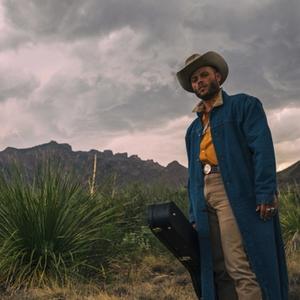




Link copied

“I could start again and pick 10 different ones,” says Charley Crockett about his latest album, 10 For Slim: Charley Crockett Sings James Hand. It’s a mesmerizing ode to the late honky tonk Texas songwriter James “Slim” Hand, who unexpectedly passed away last year. While Hand never broke through into the mainstream, he was revered by the likes of Willie Nelson - who is regularly quoted as calling him “The Real Deal” - and garnered a cult-like following around the Texas Hill Country.
For the past hour of our conversation, Crockett’s been cooking (and eating) breakfast, out in a mountain town in rural New Mexico - sharing old stories and raving about how Hand’s brand of melancholy honky-tonk, Hill Country haikus and classic country gold shaped both his songwriting and sound - something he’s dubbed Gulf & Western. For Crockett, it was Hand’s bonafide and natural authenticity that hooked him from the jump. Now, a decade later, Hand has remained a guiding North Star in Crockett’s own songwriting and craft.
“When I kept threatening to record his songs, he’d do that thing where he’d look around like something wrong was about to happen,” says Crockett. “He’d then lean back over towards you and say in your ear, ‘Well pal, I sure wish you would’”. A gleaming chuckle rises through him as he reminisces.
While Crockett had always planned on recording some of Hand’s originals, when he passed away in June of 2020, he knew he had to fast track the idea. With 10 For Slim, he offers a proper tribute to his honky tonk hero.

James “Slim” Hand was one of those songwriters who was a staple down in the Texas Hill Country. Do you remember the first time you saw him?
I think the very first time I saw him play was Midnight at the White Horse, probably in 2013. The first time I’d ever heard about him though was at The All Good Cafe, in Deep Ellum, Dallas. There were a couple of posters of his up on the wall; I think that must have been around when he cut that first Rounder record from the late ‘90s. I remember seeing photos of him on the wall and thinking, “who is this guy hunched over with his knees bent looking like Hank Williams?”
There was a quote on those posters that said ““The real deal” - Willie Nelson”. If Willie Nelson is calling him the real deal, he looks like Hank Williams and Mike has his picture hanging up at All Good’s, all that says a lot right there. I didn’t go back to Dallas for years - since I was hoboing, hitchhiking, and doing the street thing - so when I saw him at White Horse, I don’t think I’d quite put it together or realized that it was the same guy at first. I was looking around and thinking, “Am I the only one in here who can’t believe this guy is in here?” I kind of looked around and said to myself, “Yeah, I do think I’m the only one.” People were so used to him.
"He started singing and it hit me like a Mack Truck. He was like that, he could make a whole night of singers seem like amateurs"
I’d heard that it was really James’ version of the Tom T. Hall classic, ‘That’s How I Got to Memphis’, that really had a major impact on you. When you cut that song for Lil G.L’s Blue Bonanza, you wound up making a music video starring James too. What was it about his version that really touched you?
We had this thing. I’d been up for an Ameripolitan Award, a couple years back. It’d been in Memphis, at the Blues City Cafe on Beale Street. It was packed like sardines in there, with all these cowboy hats - that whole Ameripolitan crowd. James got up there with the band, somewhere near the end of the night, and he started playing ‘That’s How I Got to Memphis’. I’d known the song, but hadn’t given it much thought. Sometimes, it’s not the song, but who’s delivering it to you, that makes you realize what it is. He started singing and it hit me like a Mack Truck. He was like that, he could make a whole night of singers seem like amateurs. That’s how good he was. Sometimes he was off, but not usually.
I remember going back to the hotel and staying up all night learning that song. Being in Memphis, what he was tapping in on, the way he made you feel the story that song is telling, it just affected me. I was always playing country music on the street mixed with everything else, but James Hand - more than any other individual - really made me squarely embrace the label of being called country. It really was because of James.
This new album, 10 For Slim: Charley Crockett Sings James Hand, comes out nearly a year after James passed away. I’m sure you’ve wanted to do this for a while, but did his passing really just push you to cut the album sooner?
I remember I was out in California, recording these different music videos for Welcome to Hard Times, when I heard he had passed. I just cried, and immediately thought about how I’d told him I was going to record these songs. I just thought he was so unappreciated, in every way. It’s not to say he didn’t get opportunities or chances, but with a guy like that, it sometimes takes somebody recording their songs. I wanted to get it recorded and in front of people, so it wasn’t like James’ name was fading or that he was just one of these central Texas bar-type country singers.
I called Billy Horton, Jay Moeller, and the guys telling them all what I wanted to do. I was able to look through his catalog and play what I felt really reached me. In doing that, a couple things happened. As I looked at his catalog, absorbed it and decided what I wanted to put on the album, I realized just how great he was. I could relate to him in so many ways.
Speaking of that catalog, how did you wind up picking these 10 songs for the album? It’s never easy to just choose an album’s worth of songs from someone’s whole song catalog.
I’m not sure anyone has taken and picked 10 from his catalog like this. If you go through these songs, you can see a man who wrote as well as Hank Williams in 1950. A song like ‘Mighty Lonesome Man’; had Hank Williams lived a little longer, he’d have probably written that song - it’s that good. ‘So Did I’ is like something you’d hear from a Little Darlin’-era Johnny Paycheck. You look at ‘Lesson in Depression’ and ‘Midnight Run’, we cut those because, if you ask me, those two are as good as any. There's a timelessness to them.
When you look at James’ catalog, in my opinion at least, you can see that he really was one of these country music geniuses. He did live in our times and made it to 2020, but he had that thing where he could authentically deliver like Hank Williams and proved to you he could write and sing like Gary Stewart. I’m preaching here, but you can hear Willie Nelson, George Jones, Stonewall Jackson, Wynn Stewart, and all these people in him. When you hear all those great voices, I can hear a little bit of James in there too. Not in the way where he’s copying them, but because he was from little West, Texas and because of the way he lived, he just had it. I’ve said it a million times and I’m always going to say it when somebody asks me about James Hand, but I never was able to meet George Jones, Hank Williams or any of those guys, but I did know James Hand. In that way, I’ve shaken hands with truly the greatest.
You were able to develop that friendship with him over the years. That’s not necessarily something most people are able to do with their favorite country songwriters. Y’all were able to play some shows together - and it’s in part why you wound up cutting this album - how important has it been for you to introduce some of James’ music to a newer generation of country music fans?
He didn’t need me promising anything, but I kept threatening to record his songs. I’d kept telling him to come on the road with us, hop on the bus and let the guys back him up. I wanted him to get in front of these crowds we’d built up, mostly thanks to Turnpike Troubadours and Jon Folk at Red 11. Our audience was really loving James, and in a lot of ways, he should have been playing last. So we’d been trying to convince him to come on the road with us. He wasn’t sure about it. You know, he was 67, 68 years old. He finally decided that he was ready to give it another shot and get in front of young people. That was so exciting, watching him play shows with us, seeing how excited our audience was. Some folks obviously knew who he was, but there were a lot of young people who had never seen him before. That was really amazing to watch. I saw people respond to him in a way that I had.
Now that I think about this, the last live show I saw was him at The White Horse, before they closed for the year due to COVID. It was James playing the midnight show in March. I remember he tried to give me his pay that night because I was out of work.
Nine of these songs, they’re from James’ recorded catalog. That final song, ‘Slim’s Lament’, isn't found on an album though. Was that something you wound up writing about James or was that from some unrecorded material?
That last one was this song he sent me. He’d been demoing songs on his iPhone. He had sent me two or three, not long before he died. We ended up calling it ‘Slim’s Lament’ because it didn’t have a title. The tag-line was “I’m praying to God, but I’m calling for you” and it’s this whole song where he’s saying “I swear that I tried everything but suicide, oh death, you’ll have so little left to claim.” It was this crazy song we ended up adding to the album.
You’ve stepped into a lot of these honky tonks and bars across the country yourself over the years. You know the stories and people as soon as you walk in the door, even if it’s your first time there. Many of James’ songs tapped into that same familiarity, there was some of that same restlessness?
Speaking of that, you know what song of his is one of the greatest barroom honky-tonk country songs ever written? It’s ‘Over There That’s Frank’. It’s right up there with anything Willie, Johnny Bush, Johnny Paycheck, or George Jones ever wrote or sang. That was the one song that I felt I did some justice and I’m proud of my version, but his recording of that song and the picture he paints, that could be anybody’s life in any town. You can’t out-write that song. You may hope to get in that spirit, but it can’t be out-written or out-sang.
Charley Crockett's new album, Ten For Slim: Charley Crockett Sings James Hand, is out now via Son of Davy / Thirty Tigers.
Photography by Ryan Vestil.
For more on Charley Crockett, see below:






